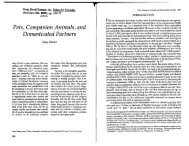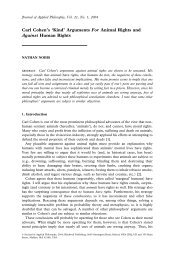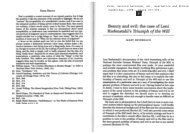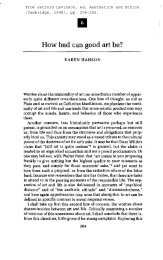36 Environmental disobedience - Ned Hettinger
36 Environmental disobedience - Ned Hettinger
36 Environmental disobedience - Ned Hettinger
You also want an ePaper? Increase the reach of your titles
YUMPU automatically turns print PDFs into web optimized ePapers that Google loves.
ENVIRONMENTAL DISOBEDIENCE 505claim, then the negative consequences of militant activism pale in comparison to theevils to be avoided. Of course, one must also argue that such tactics are effective inbringing about the desired results. Further, even if militant action is successful instopping particular ecological insults, one must show that militant environmental<strong>disobedience</strong> does not turn the public against environmental causes, and thusdamage the environmental movement as a whole. Michael Martin (1990) presentsa thorough analysis of these consequentialist arguments for militant ecoactivism inthe context of American environmentalism.While this consequentialist approach to the justification of militant eco-activismraises important issues, it is of limited significance. By its very nature, it fails toconsider non-consequentialist concerns, including the special burden of justificationwhich acts of militant <strong>disobedience</strong> must bear. From a straight consequentialistperspective. that such acts are illegal and undemocratic is not itself directly relevantto the assessment of their legitimacy. Purely consequentialist justifications also fail toexamine the relationship between environmental theory and the democratic basis ofpolitical obligation. But many green theorists argue that a commitment to participatorydemocratic procedures is part of the very substance of a deep environmentalworld-view. Those who practice militant, environmental <strong>disobedience</strong> which coercesthe majority must respond to the charge that their practices are inconsistent withtheir own values.An analysis of the relationship between democracy and environmental theory isthus crucial to the task of assessing militant environmental <strong>disobedience</strong>. If radicalenvironmentalism were not committed to the democratic basiS of political obligation,then militant tactics would not confront the Significant burden of justification createdby the democratic sanction of law. Is the deep bow ordinarily given to democraticprocedures appropriate from a radical environmental perspective?The critique of humans-only democracyNon-anthropocentric environmentalists who accept the idea that humans are plainmembers and citizens of biotic communities and not the one pre-eminent andprivileged species - can mount a serious critique of modern democracies. Democracyis a humans-only political institution. It is a political procedure that arrogates allpower. authority. and legitimacy to one out of millions of species. It is a system thatlegitimizes decision-making authority by reference to a set of abilities - namely,consent. voting, delegation - that non-humans are constitutionally unable to manifest.The vast majority of the interests, goods, and values that should count accordingto non-anthropocentric moral theory have no guaranteed standing in democraticprocedure. Democracy does allow individual humans to set aside their own interestsand cast their votes for non-human interests and value. But this merely highlights theinjustice of a system that prohibits non-humans from counting politically in their ownright (see POUTICS).It might be objected that because non-humans are incapable of political participation.it is not democracy's fault that they are disenfranchised. for any way ofstructuring political participation would have this result. If the aim of politicalinstitutions is to find decision procedures that fairly adjudicate between all
















